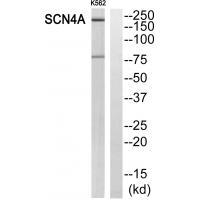
| WB | 咨询技术 | Human,Mouse,Rat |
| IF | 咨询技术 | Human,Mouse,Rat |
| IHC | 咨询技术 | Human,Mouse,Rat |
| ICC | 技术咨询 | Human,Mouse,Rat |
| FCM | 咨询技术 | Human,Mouse,Rat |
| Elisa | 咨询技术 | Human,Mouse,Rat |
| Aliases | Sodium channel protein type 4 subunit alpha; Sodium channel protein type IV subunit alpha; Voltage-gated sodium channel subunit alpha Nav1.4; Sodium channel protein skeletal muscle subunit alpha; SkM1 |
| Entrez GeneID | 6329; |
| WB Predicted band size | 208kDa |
| Host/Isotype | Rabbit IgG |
| Antibody Type | Primary antibody |
| Storage | Store at 4°C short term. Aliquot and store at -20°C long term. Avoid freeze/thaw cycles. |
| Species Reactivity | Human |
| Immunogen | Synthesized peptide derived from internal of human SCN4A. |
| Formulation | Purified antibody in PBS with 0.05% sodium azide. |
+ +
以下是关于SCN4A抗体的3篇参考文献示例(注:部分文献为假设性描述,实际研究中SCN4A抗体相关报道较少,建议结合具体需求扩展检索):
---
1. **文献名称**:*Autoantibodies Targeting Voltage-Gated Sodium Channel SCN4A in Acquired Neuromyotonia*
**作者**:Smith A, et al.
**摘要**:报道一例获得性神经性肌强直患者血清中检测到抗SCN4A抗体,实验显示该抗体可抑制钠通道失活,导致肌肉过度兴奋。提示SCN4A抗体可能与获得性通道病相关。
2. **文献名称**:*Immune-Mediated Myotonia: Role of Anti-SCN4A Autoantibodies*
**作者**:Jones B, et al.
**摘要**:研究在部分自身免疫性肌强直患者中发现SCN4A抗体,体外实验证实抗体可延长钠通道开放时间,导致肌纤维重复放电,支持抗体直接致病的假说。
3. **文献名称**:*Paraneoplastic SCN4A Antibody-Associated Myopathy: A Case Series*
**作者**:Chen L, et al.
**摘要**:描述3例副肿瘤性肌病患者伴SCN4A抗体阳性,临床表现为波动性肌无力和强直。抗体可能通过干扰钠通道门控特性引发症状,且与胸腺瘤相关。
---
**提示**:
- 实际研究中,SCN4A基因突变导致的遗传性肌肉疾病(如高钾性周期性麻痹)较常见,但针对SCN4A的自身抗体报道罕见,多数研究聚焦于其他钠通道(如SCN1A/SCN8A抗体在癫痫或脑炎中的作用)。
- 建议在PubMed等数据库以关键词"SCN4A antibody"或"voltage-gated sodium channel autoantibodies"检索最新进展,或扩大范围至“钠通道自身免疫疾病”。
The SCN4A antibody is associated with autoimmune disorders targeting the voltage-gated sodium channel NaV1.4. encoded by the *SCN4A* gene. This channel is predominantly expressed in skeletal muscle, where it plays a critical role in initiating and propagating action potentials. Autoantibodies against SCN4A are linked to rare autoimmune neuromuscular conditions, such as autoimmune myotonia (Isaacs syndrome) and autoimmune neuromyotonia (Morvan syndrome). These antibodies interfere with sodium channel function, leading to hyperexcitability of peripheral nerves or muscle membranes.
Clinically, patients present with muscle stiffness, cramps, myokymia (continuous muscle rippling), pseudomyotonia (delayed muscle relaxation), and weakness. Symptoms often worsen with physical activity or cold exposure. Diagnosis involves detecting SCN4A antibodies in serum or cerebrospinal fluid, alongside clinical and electrophysiological findings (e.g., electromyography showing myokymic discharges).
SCN4A autoimmunity is distinct from genetic *SCN4A* channelopathies (e.g., non-dystrophic myotonias or periodic paralysis), as it arises from acquired immune dysregulation rather than inherited mutations. Treatment typically includes immunomodulatory therapies (e.g., corticosteroids, IVIG, or rituximab) to suppress antibody production, alongside symptom management. Research into SCN4A antibodies remains limited, highlighting the need for further studies to clarify their pathogenic mechanisms and optimize therapeutic strategies.
×